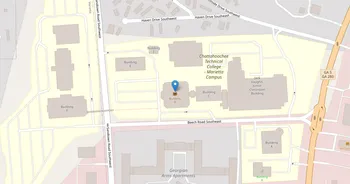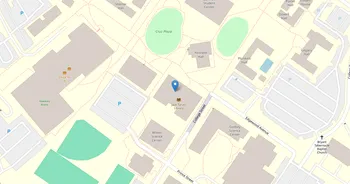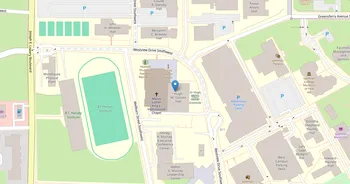Life University : Overview, Courses, Scholarships & Rankings
About Life University
Near Marietta's historic square, Life University is known for a wellness-centered academic approach. Strengths land in the health sciences, human biology, and human performance, with coursework that blends lab practice, case-based learning, and clear, compassionate communication. Faculty emphasize evidence-informed care and ethics, and students get guided practice that builds real confidence without losing the human side of service.
The campus offers bright labs, a solid library, quiet study spots, a lively student center, and a full fitness center, plus tutoring, counseling, advising, and career coaching. Student life leans active and service-minded with clubs, intramurals, mindfulness meetups, and time outdoors on a green, walkable campus. The culture feels close-knit and purpose-forward. Career prep includes internships, shadowing, and employer meetups, with connections to regional health providers. Marietta adds arts, parks, and good food, while Atlanta's wide network sits a short drive away. The distinguishing thread is a whole-person focus woven through classes and campus life.
Key Institutional Details
Contact & Profile
Academic & Institutional
Academic Programs & Fields of Study
Life University offers 14 degree programs across 10 major academic fields, graduating approximately 574 students annually. The most popular fields by graduate volume are Health (3 programs, 307 graduates), Biological Sciences (3 programs, 72 graduates), Psychology (1 programs, 67 graduates), Business (1 programs, 43 graduates) and Liberal Arts (1 programs, 41 graduates). Explore program details, award levels, and graduate demographics below.
Health (3 programs, 307 graduates)
Healthcare Professions, Medical Sciences and Clinical Practice
| Program Name | Graduates | Gender Distribution | Award Levels | CIP Code |
|---|---|---|---|---|
| Chiropractic Medicine | 304 |
|
Doctorate (P)
|
51.0101 |
| Dietetics | 2 |
|
Bachelor's
|
51.3101 |
| Health and Wellness | 1 |
|
Bachelor's
|
51.0001 |
Biological Sciences (3 programs, 72 graduates)
Life Sciences, Biotechnology and Biomedical Research
| Program Name | Graduates | Gender Distribution | Award Levels | CIP Code |
|---|---|---|---|---|
| Exercise Physiology and Kinesiology | 47 |
|
Bachelor's
|
26.0908 |
| Biology and Biological Sciences | 24 |
|
Bachelor's
|
26.0101 |
| Ecology and Evolutionary Biology | 1 |
|
Bachelor's
|
26.1399 |
Psychology (1 programs, 67 graduates)
Psychological Sciences, Mental Health and Behavioral Studies
| Program Name | Graduates | Gender Distribution | Award Levels | CIP Code |
|---|---|---|---|---|
| General Psychology | 67 |
|
Bachelor's
Master's
|
42.0101 |
Business (1 programs, 43 graduates)
Business Administration, Marketing and Entrepreneurship
| Program Name | Graduates | Gender Distribution | Award Levels | CIP Code |
|---|---|---|---|---|
| Business Administration and Management | 43 |
|
Bachelor's
|
52.0201 |
Liberal Arts (1 programs, 41 graduates)
Liberal Arts Education, General Studies and Humanities
| Program Name | Graduates | Gender Distribution | Award Levels | CIP Code |
|---|---|---|---|---|
| General Studies | 41 |
|
Bachelor's
|
24.0102 |
Kinesiology (1 programs, 27 graduates)
Exercise Science, Sports Medicine and Physical Recreation
| Program Name | Graduates | Gender Distribution | Award Levels | CIP Code |
|---|---|---|---|---|
| Sports, Kinesiology, and Physical Education | 27 |
|
Master's
|
31.0501 |
Computer & IT (1 programs, 8 graduates)
Computer Science, Information Technology and Cybersecurity
| Program Name | Graduates | Gender Distribution | Award Levels | CIP Code |
|---|---|---|---|---|
| Computer and Information Technology Administration and Management | 8 |
|
Bachelor's
|
11.1099 |
Human Sciences (1 programs, 7 graduates)
Family Studies, Consumer Sciences and Human Development
| Program Name | Graduates | Gender Distribution | Award Levels | CIP Code |
|---|---|---|---|---|
| Human Nutrition | 7 |
|
Bachelor's
Master's
|
19.0504 |
Personal Services (1 programs, 1 graduates)
Hospitality Management, Culinary Arts and Personal Care
| Program Name | Graduates | Gender Distribution | Award Levels | CIP Code |
|---|---|---|---|---|
| Culinary Science | 1 |
|
Bachelor's
|
12.0509 |
Interdisciplinary (1 programs, 1 graduates)
Cross-Disciplinary Studies and Integrated Research Programs
| Program Name | Graduates | Gender Distribution | Award Levels | CIP Code |
|---|---|---|---|---|
| Biopsychology | 1 |
|
Bachelor's
|
30.1001 |
Admission Requirements & Test Scores
Comprehensive overview of admission criteria, standardized test score ranges, and application requirements for prospective students at Life University.
Application Requirements
Data based on IPEDS for 2022-2023 academic year. Test score ranges represent the middle 50% of admitted students (25th-75th percentile). Requirements may vary by program.
Tuition, Fees & Estimated Costs
Overview of tuition rates, housing, and other annual education expenses for undergraduate and graduate students
Financial Aid & Student Support
Summary of scholarships, grants, student loans, and financial aid statistics for undergraduate students
Student Success Metrics
Graduation rates and post-graduation earnings to help assess student outcomes and long-term value of education.
Loan Burden & Repayment Outcomes
Breakdown of loan repayment rates and student debt levels by income and dependency status.
Frequently Asked Questions
Find answers to the most common questions about Life University
How much does it cost to attend Life University?
The annual tuition at Life University is $15,036 for in-state students. When including room and board, books, and other expenses, the total estimated cost is approximately $41,295 for in-state students. Additional costs include room and board $13,959 (on) / $16,413 (off) and books and supplies $2,400.
Data based on IPEDS program completions for 2022-2023 academic year. Tuition and cost estimates are approximate and may not include all fees, personal expenses, or transportation costs.
What academic programs and degree levels does Life University offer?
Life University offers 14 academic programs across 10 major fields of study, with available degree levels: Associate's, Bachelor's, Master's, Doctorate (Professional).
Most popular program areas include:
- Healthcare Professions, Medical Sciences and Clinical Practice (3 programs)
- Life Sciences, Biotechnology and Biomedical Research (3 programs)
- Psychological Sciences, Mental Health and Behavioral Studies (1 programs)
- Business Administration, Marketing and Entrepreneurship (1 programs)
- Liberal Arts Education, General Studies and Humanities (1 programs)
Data based on IPEDS program completions for 2023-2024 academic year. Numbers reflect programs where students graduated, not all offered programs.
What is the acceptance rate for Life University?
Life University has an 93.8% acceptance rate and a 54.1% yield rate, making it moderately selective.
Admission statistics breakdown:
- Total applicants: 404
- Students admitted: 379
- Students enrolled: 205
Data based on IPEDS for 2022-2023 academic year. Admission statistics may vary by program and application cycle.
What financial aid and scholarships are available at Life University?
Life University provides financial aid to 18% of first-time, full-time students, with average grants of $10,926 and average loans of $7,062.
Average financial aid amounts by type:
- Pell grants: $5,857
- State/Local grants: $2,277
- Institutional grants: $9,030
- Federal loans: $6,053
The university supports 146 students with grants and 92 students with loans annually.
Data based on IPEDS for 2022-2023 academic year. Financial aid amounts and percentages may vary by program, enrollment status, and individual circumstances.
What is the average salary for Life University graduates?
Life University graduates earn a median salary of $37,368 after 6 years and $47,397 after 10 years.
The salary range 10 years after graduation spans from $25,502 (25th percentile) to $73,921 (75th percentile), with top earners reaching $90,300 (90th percentile).
Data based on IPEDS for 2022-2023 academic year. Salary data reflects graduates who received federal financial aid (approximately 60% of all graduates). Actual earnings may vary significantly based on program, location, and individual circumstances.
Related Universities




Found something useful? Help others discover it too! Share with friends, on social media, or save for later - every share helps someone find the information they need.